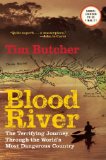Summary | Excerpt | Reviews | Beyond the book | Read-Alikes | Genres & Themes | Author Bio

Water--The Defining Crisis of the Twenty-First Century
by Fred PearcePearce traveled around the world, visiting more than thirty
countries, to research When The Rivers Run Dry, and the report he brings
back is, to be honest, pretty depressing but nonetheless very important to know
about. From the Indus in Pakistan, to the Yangzte in China and to the
Colorado River in the US, not forgetting the Amazon, the Nile and the Congo -
the majority of the world's great waterways, and thus the huge populations who
rely on them, are in crisis; and it's not just the rivers themselves but the
vast underground reservoirs that are being drained too.
The solution isn't easy but, according to Pearce, it is possible - we need to
change how we think of water - instead of thinking of water as an endlessly
renewal source that falls from the sky we need to think of it as a limited and
precious resource that needs to be conserved - and he's not talking about
putting a brick in the toilet or cutting down ones time in the shower, the first
step is for us to understand our real water consumption and where that water
comes from.
You might well think that the only rivers that
should be of concern to us are the ones in our own back yard but to think that
doesn't take into account our "virtual water" consumption. For example, an
average American might use about 40 gallons of water a day for drinking, washing
and cleaning, perhaps double that if they live in the suburbs with a yard to
water. However that is a tiny fraction of the water we actually consume
because it takes 250-650 gallons of water to grow a pound of rice, 130 gallons
to grow a pound of wheat, 65 gallons to grow a pound of potatoes, 3,000 gallons
to make a quarter-pound burger (assuming the cow is grain fed) and 500-1,000
gallons to create a quart of milk, a pound of sugar can take 400 gallons of
water to grow and a pound of coffee tips the scales at 2,650 gallons of water!
Pearce estimates that the average meat-eating, beer-swilling American consumes
100-times his own weight in water every day! As for the clothes on our
backs - it takes 25 bathtubs of water to grow the 9 ounces of cotton to create
one t-shirt! So, when we drink our Central American coffee, and consume
our Thai rice or wear Pakistani cotton we are influencing the hydrology of those
regions. If all the water used to irrigate the crops fell from the sky as rain or was taken from rivers or underground sources in sustainable amounts we'd be in good shape, but sadly and increasingly, that is not the case (see sidebar for more on this).
Of course, life isn't as simple as stop consuming and the problems will go away.
The good news is that water is never destroyed - whatever we do to it,
somewhere, sometime it will return - every day more than 800 million acre-feet
of rain fall on the earth - the challenge is not having enough water but
ensuring that the water is where we need it. Pearce doesn't believe we
need more and bigger dams but feels that we need to manage the water cycle
better, to return to the ancient ways of "harvesting the water where it falls"
but also utilizing high-tech irrigation methods to provide "more crop per drop",
and above all, we need to "manage the water cycle for maximum social benefit
rather than narrow self-interest". He calls for a second agricultural
revolution - we've had the green revolution which increased harvests to feed a
growing world population but at the expense of water supplies (the new
high-producing crops tend to use more water than traditional varieties) - now we
need a blue revolution before the gains of the past generations are wiped out - all easy things to say but difficult to
put into practice!
All in all, this is a very interesting book that explores and addresses the
water issues facing the world. The only
factor that this, and most books about specific environment issues, seems to
avoid discussing entirely is the overwhelming factor that is at the heart of all
of our environmental issues - there are just too many people on our little
planet!
![]() This review was originally published in The BookBrowse Review in August 2006, and has been updated for the
March 2007 edition.
Click here to go to this issue.
This review was originally published in The BookBrowse Review in August 2006, and has been updated for the
March 2007 edition.
Click here to go to this issue.

If you liked When the Rivers Run Dry, try these:

by Tim Butcher
Published 2009
An utterly absorbing narrative that chronicles Tim Butcher’s forty-four-day journey along the Congo River, Blood River is an unforgettable story of exploration and survival.

by Charles Clover
Published 2008
"Here is the world’s fishing industry laid bare, gutted and filleted for all to see: the greed, the folly, the waste and destruction. You will never look at a fish supper in the same way again." - The Economist.
Your guide toexceptional books
BookBrowse seeks out and recommends the best in contemporary fiction and nonfiction—books that not only engage and entertain but also deepen our understanding of ourselves and the world around us.